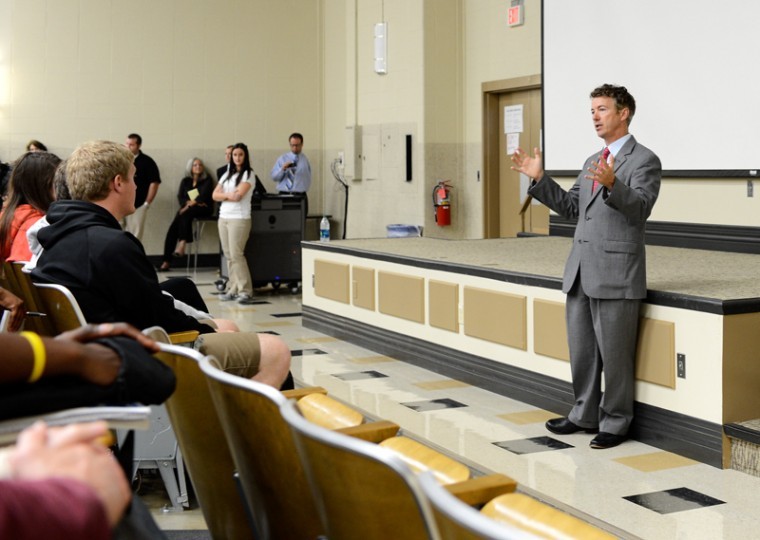Sen. Rand Paul speaks to WKU students about national issues
October 15, 2012
Imagine WKU president Gary Randsell training Sen. Rand Paul (R-Ky.) to play baseball with a round of batting practice. Not only did this actually happen, but Paul credits it with his two hits in the Republican and Democrat Congressional baseball game.
Paul told that story and others as he gave WKU students their own up-close view of national politics in a packed Grise Hall auditorium, earlier today. He also held a question and answer session with WKU students and faculty.
Paul, the son of libertarian-leaning Sen. Ron Paul (R-Tx.), used the speech to underscore reasons why he thinks his approach to government is the most effective.
He asked three questions in his speech: What is the difference between a republic and a democracy, what is the difference between positive and negative rights, and why government is a necessary evil.
“If you answer all of these correctly, maybe you’ll be a libertarian,” Paul said.
While addressing the first question, Paul said the difference between a republic and democracy is that a republic has a restrained government that cannot infringe on certain rights, while a democracy is merely majority rule.
“The constitution allows the people to restrain government, and not the government to restrain the people,” Paul said.
Paul said a Constitutional republic creates the proper role of government because it recognizes that rights pre-exist government and that he views the Constitution in a “strict form.”
Over the summer, Paul received some flak for his views on the Supreme Court and the Constitution. He said President Obama’s health care law is still unconstitutional, immediately after the Supreme Court upheld the law on a 5-4 decision. Paul addressed this criticism during his speech.
“It’s not that I’m questioning the validity of the Supreme Court, it’s just that I disagree with the ruling,” Paul said.
According to Paul, criticism he and Sen. Paul Ryan (R-Wi.) have received for their view on cutting some social services “defies the Bible,” but Paul said the Bible regards helping others as a role for charity, not government.
“I don’t remember Jesus saying it was the Roman government, that it was their obligation to take care of the poor,” Paul said.
Paul said these types of programs should not be implemented just because they are unconstitutional, but also because of their huge cost to the federal government.
“Any program when it finally gets into place we find it cost 10 times or a hundred times of what it supposed to cost,” he said.
Paul said the biggest booms in the economy occurred after taxes were cut for the rich. Even more than business, Paul said individuals who least can afford it are harmed by the large federal deficit because of its ensuing inflation.
“Big government or deficits in general, hurt the poor, the working class and senior citizens on fixed income more,” he said.
Inflation, or the devaluation of the dollar, is one reason why Paul said he supports greater transparency for the Federal Reserve, the entity that controls U.S. monetary policy.
During the question session, an audience member asked if Paul thinks the Federal Reserve should be abolished, a position taken by Paul’s father.
“As a first step we should audit the Federal Reserve,” he said. “As far as abolishing we are a ways away from that.”
While Paul thinks the government should be “minimized,” he still says there should be a role for government, particularly in police forces and national defense.
Paul has used his time in the Senate to draw attention to some parts of national defense and foreign policy he disagrees with. He is currently pushing a bill the Senate to put restrictions on foreign aid to Egypt, Libya and Pakistan.
When Paul, who voted for sanctions against Iran, was asked whether he would vote for a declaration of war against Iran if Israel launched a strike against them, Paul said he “does not believe in pre-emptive war.”
“I’m not in favor of a pre-emptive attack on Iran,” Paul said.
Paul emphasized that the upcoming election is extremely important because of the rising debt and deficit and said voters should ask whether certain government programs are really worth it.
“For every ounce of government you get, you give up an ounce of liberty,” Paul said.















